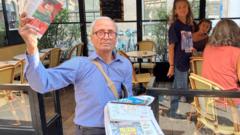As President Emmanuel Macron embarks on a three-day state visit to the UK — the first by a French leader since 2008 — the significance of this trip extends far beyond ceremonial observances. The visit represents an opportunity to mend ties strained under Brexit, with King Charles III acting as a keystone diplomat amid shifting political landscapes.
**Reviving Franco-British Relations: King Charles' Diplomatic Role During Macron's State Visit**

**Reviving Franco-British Relations: King Charles' Diplomatic Role During Macron's State Visit**
A pivotal state visit from President Macron aims to mend Franco-British relationships post-Brexit, with King Charles III serving as a crucial diplomatic figure.
In light of escalating challenges in Europe, including the ongoing war in Ukraine and migrant crises, the state visit places emphasis on mutual cooperation and understanding. The couple’s engagements will range from official gatherings and speeches at Westminster to a forthcoming UK-France summit addressing critical diplomatic matters including migration and defense strategies.
Recent months have witnessed warming relations between the UK and France following years of tension. Characterized by intertwined political interests and shared global security responsibilities, both nations aim to solidify their joint efforts in defending Ukraine against external threats, while also navigating the contentious issue of irregular migration across the English Channel.
King Charles III has been recognized as more than a mere ceremonial figure, using his long-standing relationship with France to foster diplomacy. He adeptly navigated complex international dynamics, interacting with key leaders, including Ukraine's President Zelensky, reinforcing the notion that the monarchy plays a significant role in global relations.
While governance and political trust remain ongoing concerns, observers note that the need for cooperation on global issues presents a compelling backdrop for dialogue. The symbolism of King Charles III alongside Macron resonates profoundly, signaling a mutual commitment to rejuvenate a partnership that both nations consider vital to future security and prosperity. As both leaders prepare for negotiations, their collaboration could potentially set a precedent for addressing Europe’s broader migratory challenges.
If a comprehensive agreement can be achieved amidst persistent issues, it may not only pave the way toward mending ties but also signal a forward-thinking approach in Franco-British relations as they brace themselves for challenges in the 21st century.
Recent months have witnessed warming relations between the UK and France following years of tension. Characterized by intertwined political interests and shared global security responsibilities, both nations aim to solidify their joint efforts in defending Ukraine against external threats, while also navigating the contentious issue of irregular migration across the English Channel.
King Charles III has been recognized as more than a mere ceremonial figure, using his long-standing relationship with France to foster diplomacy. He adeptly navigated complex international dynamics, interacting with key leaders, including Ukraine's President Zelensky, reinforcing the notion that the monarchy plays a significant role in global relations.
While governance and political trust remain ongoing concerns, observers note that the need for cooperation on global issues presents a compelling backdrop for dialogue. The symbolism of King Charles III alongside Macron resonates profoundly, signaling a mutual commitment to rejuvenate a partnership that both nations consider vital to future security and prosperity. As both leaders prepare for negotiations, their collaboration could potentially set a precedent for addressing Europe’s broader migratory challenges.
If a comprehensive agreement can be achieved amidst persistent issues, it may not only pave the way toward mending ties but also signal a forward-thinking approach in Franco-British relations as they brace themselves for challenges in the 21st century.




















